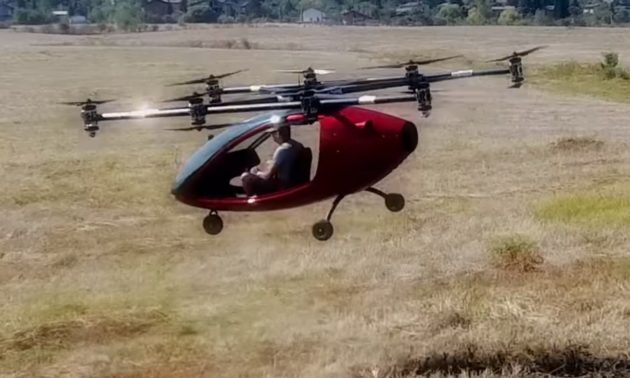 Passenger Drone's prototype undergoes a flight test in Switzerland. (Passenger Drone via YouTube)
Passenger Drone's prototype undergoes a flight test in Switzerland. (Passenger Drone via YouTube)
"Taking autonomous to the sky: You knew it was coming."
Swiss-based Passenger Drone is following up on the tag line from one of its videos by declaring that its autonomous flying machine is indeed taking people into the sky on test flights.
The car-sized, electric-powered, 16-rotor copter has been stealthily under development for months. Robotic flight tests began in Switzerland in May, kicking off a succession of outings with simulated payload weights.
The first flights with passengers on board took place in early September, Peter Delco, one of the partners in the project, told GeekWire in an email.
"Passenger feedback is overwhelming — the Passenger Drone is very easy to fly in both manual and autonomous modes," the Zurich-based company said in a news release that Delco passed along.
According to the product specifications, the drone weighs 520 pounds and can take on one or two passengers for a maximum takeoff weight of 800 pounds. Maximum speed is 45 mph, and maximum flight time without range extender is 25 minutes, which translates to a range of 20 miles.
Delco said a ballistic parachute will be added to the airframe in the next few months.
"The drone is probably 95 percent finished, and everything works perfect," he said. "From here, we will concentrate mainly on testing the existing technology. … The big task from now on will be to test and try to find potential faults and make sure the system is 101 percent failsafe."
He said the company plans to start the certification process with the U.S. Federal Aviation Administration and the European Aviation Safety Agency in early 2018, and aims to make the drone commercially available in 2019.
"Price range will be $150K+," Delco wrote. He surmised that the vehicles could be operated under the same rules that govern ultralight flying vehicles, even though the Passenger Drone would be on the heavy side as described in the specs.
One reason we might have known autonomous flying vehicles were coming is because so many projects are up in the air. Just this week, a Daimler-backed German venture called Volocopter demonstrated its 18-rotor, autonomous flying-taxi prototype during a five-minute flight in Dubai (with Crown Prince Sheikh Hamdan bin Mohammed as the passenger).
Other ventures testing flying cars include Airbus, Terrafugia, China's EHang, Germany's Lilium, Slovakia's AeroMobil, Japan's Cartivator Project — and Kitty Hawk, a California company that's backed by Google co-founder Larry Page.
As if that's not enough, Boeing and a prize program called GoFly have just announced a $2 million, two-year competition aimed at fostering the development of new personal flying machines.
Sounds like the skies could get crowded in the next two years — unless some of these ventures end up being grounded due to regulatory wrangling or financial fadeouts.
Source: Passenger Drone joins the fray in global race to market autonomous flying cars
No comments:
Post a Comment